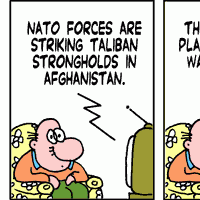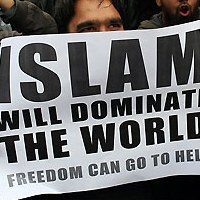Tue, June 22, 2010 | The Problem Isn’t McChrystal’s But That McChrystal (On Administration, Not Afghanistan) Is Right | by Barry Rubin

U.S. President Obama during a conversation with General Stanley McChrystal (the president's airplane "the Air Force One")
The Problem Isn’t McChrystal’s But That McChrystal (On Administration, Not Afghanistan) Is Right
There are two ways of looking at General Stanley McChrystal’s interviews with Rolling Stone magazine: one is to focus on whether he should have said such things, the other is to analyze the important truths he unveiled. Here, I’m going to look at the latter and, following my usual practice, I’ve actually read the article and will base myself on the text.
But first, think about it: the general pointed out the near-disastrous situation with American leadership today. An increasing number of people know that he’s correct in his assessment. Isn’t that what’s really important?
Incidentally, the Obama Administration has been pretty tight about leaks, so there has been less news about infighting and incompetence than usual, not to mention that much of the media has protected it from exposures and criticisms. So McChrystal hasn’t just given us some blunt-worded reactions but a peak into what’s really happening.
On its cover, Rolling Stone called him, “The Runaway General,” saying he is carefully watching “the wimps in the White House.” Coming from Rolling Stone, this phrase is presumably intended to mock the general. To anyone who cares about U.S. security, however, it rings true, a warning rather than a whining.
Thus, Michael Hastings has written an article important not for back-biting gossip about who doesn’t like who but because it tells a lot about the looming tragedy on the ground in Afghanistan and the loony situation in the goverment in Washington.
Let me digress for a moment. At a conference in Europe, I heard a pompous Washington type who knew nothing about the military or Afghanistan give a wordy speech about how great things were going there and how the idea of democratizing and stabilizing that country was just a grand idea.
After he finished his boring oration, an Afghan friend of mine, a veteran of the U.S. military and years of analyzing that country for the U.S. government, stood up and tore him apart, citing corruption, incompetence, the reality of warlord rule, and lots more in the greatest detail. My friend certainly wanted to see his country become a modern democratic state with stability and high living standards. But he had no illusions that this was going to happen, especially under American auspices.
One of the most devastating points in Hastings’ article is one whose huge significance the author himself doesn’t seem to notice. In passing, he mocks the Afghan war effort as “the exclusive property of the United States” because all of its allies have opted out. Yet doesn’t this mean that President Barack Obama’s apparent popularity with Europe is meaningless? After all, Obama has made this his war and if he cannot get any ally to support the campaign that is a devastating outcome.
At the other extreme, the most noticed point in the article was Hastings’ quote from one of the general’s top aides saying that in meeting with the generals, Obama seemed ill-prepared and disengaged. Does this surprise you? Do you doubt that it is true? What, then, is the proper reaction, to feel that McChrystal and his staff have big mouths or to be worried about the tininess of the president’s experience, knowledge, interest, focus, and decisiveness?
Having said all that, I agree with McChrystal’s critics that his doctrine of coupling counterinsurgency with a U.S. military mission to rebuild the country and society is a terrible mistake. My view is that U.S. forces should focus on damaging the enemy on the battlefield to the maxium extent possible, training local forces, and withdrawing as quickly as possible to let the Afghan army fight the war with a reasonable amount of American supplies and continued training.
Of course, the key problem is to define what “as quickly as possible” means. I’m sure that McChrystal knows far more about military issues than I do but figure that I know more about Middle Eastern politics and societies than he does. The idea that the United States is going to remake a country like Iraq or Afghanistan is as foolish as the idea that the United States can moderate regimes like Syria, Iran, or Hamas. The former is the folly of part of the contemporary right, now embraced by the Obama Administration solely in Afghanistan; the latter is the folly of the left, embraced by the Obama Administration pretty much everywhere else.
My sympathy is with my Afghan friend and also with U.S. Ambassador to Afghanistan Eikenberry, also a former general, who warns that the Afghan government is a weak reed likely to leave the United States holding the bag. In this respect, Afghanistan is a worse place than Iraq or even South Vietnam to wage the kind of war that Obama and McChrystal are fighting. Here, I agree with the author in what is, for me, the key sentence of the article:
“The need to build a credible government puts us at the mercy of whatever tin-pot leader we’ve backed – a danger that Eikenberry explicitly warned about….”
Yet Obama’s Afghanistan strategy—march in the troops and then march them out again based on a timetable known to the Taliban—seems equally flawed and politically motivated. The key element should be the arming, training, and bribing of enough forces in Afghanistan to ensure that the other side doesn’t win.
The article argues that Obama accepted McChrystal’s basic strategy but that still the war is going badly. This lays responsibility for the failure with the White House. It also notes that the policymaking process on the war is chaotic, with no one in clear leadership and lots of people competing for power. This is not only an administration with a bad world view and lots of inexperience plus ignorance, but also with a messed-up process. It is hard to imagine a recipe more likely to produce disaster.
Now, let me pose a suggestion. Read the article but pretend that it is talking about President George W. Bush and his administration. What emerges then is not primarily a “scandal” about the general and his staff saying negative things about the civilian leadership but a warning that U.S. policy—directed by a shortsighted, inept, politically motivated chief executive–is misconceived, badly run, and heading into serious trouble.
This all reminds me of the surprise turnabout in an old Polish joke from the Communist period. During a period when the working class Solidarity movement was rebelling in Poland, the Soviet leader goes to Lenin’s tomb and communes with the dead leader. The reactionaries, he says, are rebelling against Communist rule and demonstrating in the streets. Lenin rises up and says, “Arm the workers!” In other words, those who supposedly should be backing a regime that proclaimed itself to be acting in their interests saw through the pretense and opposed the government.
In this case, the people who would be outraged against mismanagement, terrible decisions, and poor leadership by Bush should wake up and see that they are facing something just as bad and dangerous for America.
The problem isn’t that McChrystal and his entourage bad-mouthed Obama and his entourage, the problem is that they are correct in doing so.
PS: Aside from the points above, I find it an absolute disgrace that White House Press Secretary Robert Gibbs publicly and officially announced before McChrystal met with Obama that the general’s firing is on the table. This is truly sleazy and unpresidential. Obama should hear McChrystal’s side of the story in a meeting. Afterward, he could fire the general if he wants, But to announce this beforehand is just a way to humiliate and intimidate a man who has long and well served his country.
About the author,
Barry Rubin is director of the Global Research in International Affairs (GLORIA) Center and editor of the Middle East Review of International Affairs (MERIA) Journal. His latest books are The Israel-Arab Reader (seventh edition), The Long War for Freedom: The Arab Struggle for Democracy in the Middle East (Wiley), and The Truth About Syria (PalgraveMacmillan). His new edited books include Lebanon: Liberation, Conflict and Crisis; Guide to Islamist Movements; Conflict and Insurgency in the Middle East; The West and the Middle East (four volumes); and The Muslim Brotherhood.



 RSS
RSS










McChrystal and the Near-Disastrous Situation With the American Leadership #usa #afghanistan #obama #tcot #jihad http://j.mp/bs5pY0